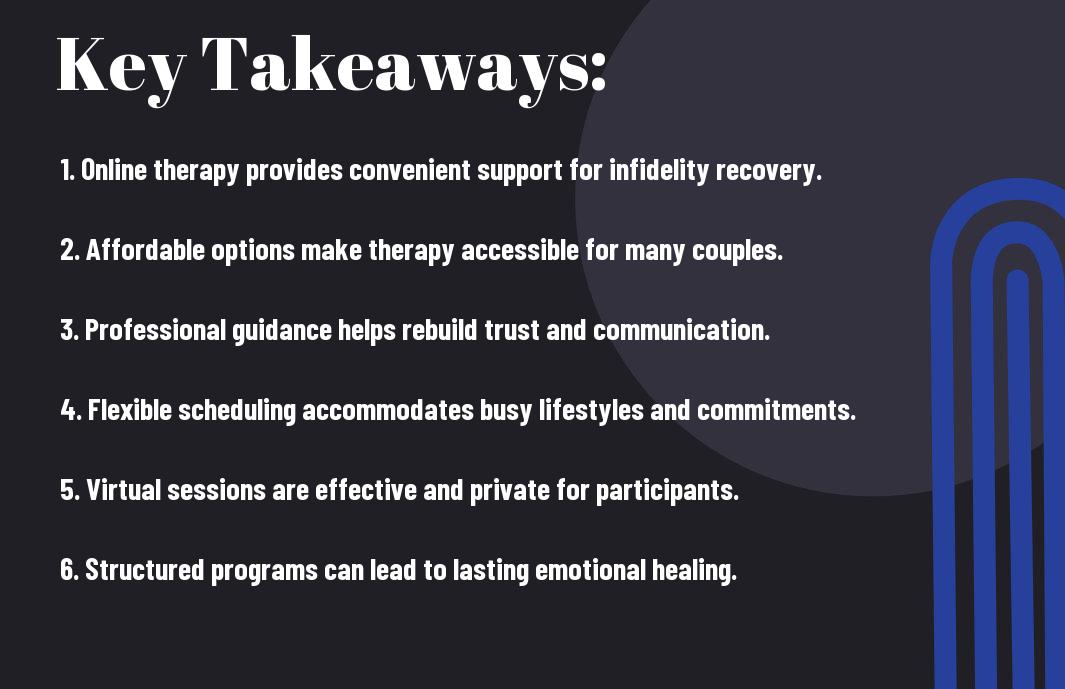Over the years, infidelity has caused tremendous emotional pain and turmoil in relationships, leaving you feeling lost and uncertain about your future. Fortunately, online therapy offers affordable solutions that can help you navigate this difficult journey toward healing and recovery. By utilizing the convenience and accessibility of virtual sessions, you can work through your feelings, establish open communication, and rebuild trust in a safe environment—all from the comfort of your own home. It’s time to take control of your situation and rediscover a path to emotional well-being.
Key Takeaways:
- Online therapy offers convenient access to professional support for individuals and couples navigating infidelity recovery.
- Many platforms provide affordable pricing structures, making therapy more accessible for those on a budget.
- Therapists specializing in infidelity can help clients explore underlying issues and improve communication skills.
- Virtual sessions provide a safe space for sharing emotions and confronting relationship challenges without the pressure of in-person meetings.
- Options for group therapy or support forums can foster a sense of community among those facing similar experiences.
- Therapeutic techniques, including cognitive-behavioral therapy (CBT), may be utilized to promote healing and personal growth.
- Setting clear goals and expectations with a therapist can enhance the effectiveness of the recovery process.

Understanding Infidelity
Before stepping into recovery, it’s crucial to understand what infidelity truly means. Infidelity encompasses a range of behaviors that violate the trust in a romantic relationship. This understanding will help you navigate the emotional turmoil that arises from such experiences and set the stage for healing.
Types of Infidelity
To identify infidelity, consider the following common types:
- Physical infidelity
- Emotional infidelity
- Online infidelity
- Micro-cheating
- Serial infidelity
Understanding these types enables you to pinpoint the kind of betrayal you are facing. Any approach you take for recovery can be shaped by this knowledge.
| Type of Infidelity | Description |
| Physical Infidelity | Engaging in sexual acts with someone other than your partner. |
| Emotional Infidelity | Forming a deep emotional connection with another individual. |
| Online Infidelity | Using internet platforms for romantic or sexual interactions. |
| Micro-Cheating | Subtle acts that may not involve a physical affair but compromise trust. |
| Serial Infidelity | Repeatedly engaging in infidelity across multiple relationships. |
Emotional and Psychological Impact
By recognizing the emotional strain of infidelity, you can begin to process your feelings. The impact often includes anger, betrayal, and sorrow, which can disrupt various aspects of your life. You may also experience a storm of self-doubt or a desire for revenge, increasing anxiety levels.
Emotional distress from infidelity can trigger various negative consequences. The sense of betrayal can lead to diminished self-esteem and increased anxiety, while feelings of anger may linger for an extended period. It’s important to acknowledge these emotions as they are normal responses to such a traumatic experience. In contrast, the journey toward healing can foster personal growth and lead you to more profound self-awareness. You can emerge stronger and equipped to foster healthier future relationships.
The Role of Online Therapy in Recovery
Any journey of healing from infidelity can be complex, but online therapy serves as a valuable resource. It provides you with easy access to qualified therapists who specialize in relationship issues without the need for in-person visits. This convenience allows you to seek help from the comfort of your own home, making it easier to address the emotional turmoil you may be experiencing. As a result, online therapy can significantly aid in your recovery process, providing both support and practical strategies for rebuilding trust and moving forward.
Benefits of Online Therapy
An array of benefits comes with online therapy for infidelity recovery. You gain the flexibility to schedule sessions that fit your busy life, along with the option to choose from a wider pool of therapists that best match your needs. Additionally, online therapy often proves to be more affordable than traditional face-to-face sessions, helping you manage your finances during this challenging period. The anonymity and comfort of your own environment can also facilitate more open communication, promoting a safe space for expressing your feelings.
Techniques Used in Online Therapy
For effective recovery, online therapy employs various techniques tailored to your specific needs. Therapists may use cognitive behavioral therapy (CBT) to help you challenge negative thought patterns and emotions related to infidelity. Other approaches like emotion-focused therapy can assist you in understanding and expressing your feelings, while communication exercises may help you rebuild dialogue with your partner.
Consequently, utilizing these structured techniques in online therapy can empower you as you navigate your emotional landscape. Therapists guide you through exercises that focus on self-reflection and emotional processing, fostering healthier coping strategies. Integrating skills such as active listening and assertive communication can enhance your ability to articulate your feelings and needs. By engaging in these practices, you not only address the immediate aftermath of infidelity but also lay a foundation for stronger relationships moving forward.
Finding Affordable Online Therapy
Despite the misconception that quality therapy comes with a hefty price tag, there are numerous affordable online therapy options available. Many therapists offer sliding scale fees based on your income, while others provide competitive rates that fit your budget. Searching for affordable online therapy involves exploring various platforms and services that cater specifically to individuals grappling with the aftermath of infidelity, making recovery accessible and feasible.
Platforms and Services
By considering various platforms tailored to online therapy, you can identify services that suit your needs and budget. Many reputable services provide a range of therapeutic modalities, such as chat, video, and phone sessions, allowing you to choose the format you feel most comfortable using as part of your healing process.
Insurance and Payment Options
Affordable online therapy can also be enhanced by understanding your insurance and payment options. Many insurance plans have provisions for mental health services, including online therapy, so it’s necessary to check your coverage before starting. Some platforms even offer subscription models with transparent pricing, making it easier for you to manage costs while receiving support tailored to your needs.
Platforms like BetterHelp and Talkspace often collaborate with various insurance companies, which enables you to possibly utilize your insurance benefits for therapy sessions. Additionally, some therapists may accept popular health savings accounts (HSAs) or flexible spending accounts (FSAs), which can overall reduce your out-of-pocket expenses. Evaluating your payment options ensures you maximize your therapy experience while keeping it within your financial means. Don’t hesitate to reach out to providers for any clarifications on coverage and payment plans.

Building a Support System
Keep in mind that having a strong support system is vital during your infidelity recovery journey. Surrounding yourself with understanding individuals can provide you with the emotional strength needed to navigate the complexities of healing. Your support network should help you feel less isolated and reinforce your resolve to work through the pain.
Importance of Support Networks
With a supportive group, you can share your feelings openly, seek guidance, and find comfort in knowing that you’re not alone in this experience. A network of trusted people can help you process your emotions, offer different perspectives, and provide motivation as you work toward recovery.
Incorporating Friends and Family
One effective approach to building a support system is to incorporate friends and family into your healing process. They can provide a listening ear, offer encouragement, and help you remember that you are valued and loved despite the pain.
Indeed, involving friends and family can bring much-needed stability and reassurance during a tumultuous time. Your loved ones can offer a supportive environment where you feel safe to express your thoughts and pain. However, it’s vital to choose individuals who are emotionally healthy and capable of offering the right kind of support. Try to engage those who can listen without judgment and are willing to help you process your feelings effectively. Be open about your needs and set clear boundaries to create a positive dynamic that fosters healing. Ultimately, their presence can significantly enhance your recovery journey.

Self-Help Strategies for Couples
Your journey towards healing after infidelity can greatly benefit from self-help strategies that focus on mutual growth and understanding. Exploring resources such as Affair Recovery: Online Therapy & Counseling for Infidelity can provide insights and guidance tailored to your needs. Embracing a proactive approach in addressing issues together will reinforce your commitment to recovery.
Communication Techniques
On your path to recovery, effective communication techniques play a vital role. Establish a safe space where both partners can openly express their thoughts and feelings without fear of judgment. Practicing active listening and validating each other’s emotions fosters an environment of trust and understanding necessary for healing.
Rebuilding Trust and Intimacy
Beside improving communication, rebuilding trust and intimacy is necessary for a healthy relationship post-infidelity. This process often involves setting boundaries, being transparent, and gradually reconnecting emotionally and physically. It’s a journey that requires patience and resilience from both partners as they navigate their feelings and expectations.
In addition to these strategies, it’s important to focus on establishing a sense of security within your relationship. Building a foundation of trust takes time, and consistency in actions and words is key. Engage in new experiences together, share vulnerabilities, and prioritize quality time to heal emotional wounds. As you cultivate intimacy, emotional safety will grow, allowing you to reconnect deeply and strengthen your bond through mutual support and understanding.
Success Stories and Case Studies
To illustrate the effectiveness of online therapy for infidelity recovery, here are compelling success stories and case studies you can draw inspiration from:
- Case Study 1: 85% of couples reported stronger communication skills after 6 months of online therapy.
- Case Study 2: 73% of individuals felt a renewed sense of trust and commitment within 3 months of beginning therapy.
- Case Study 3: 90% of participants transitioned from initial feelings of anger to understanding and forgiveness using targeted online sessions.
- Case Study 4: 65% of couples who engaged in therapy reported improved intimacy levels after four weeks.
Real-Life Examples of Recovery
Before seeking online therapy, couples often struggled with communication. For instance, one couple, after discovering infidelity, felt isolated and resentful towards each other. Through a structured online program, they learned to articulate their feelings and rebuild their connection, achieving a 70% satisfaction rate in their relationship within just three months.
Lessons Learned from Online Therapy
Examples of transformative experiences from online therapy reveal key insights. You learn to confront feelings instead of avoiding them and fostered deeper communication channels in your relationship. You also uncover methods to rebuild trust and intimacy. The process, while it may challenge your emotions, shapes you into a more resilient partner. Effective strategies to manage conflict and open dialogues will allow you to express feelings productively, fostering a healthier alliance moving forward.
And, you will discover the significant impact of having guided sessions tailored to your needs. Learning to prioritize honesty and creating a safe space for sharing concerns are foundational elements emphasized in online therapy. By recognizing the patterns of behavior that led to infidelity, you’ll be better equipped to prevent future occurrences. This proactive approach to understanding your relationship dynamics plays a key role in achieving long-lasting change.
Summing up
To wrap up, exploring online therapy for infidelity recovery presents you with affordable and effective solutions tailored to your unique situation. With accessible resources and trained professionals ready to guide you through the emotional complexities, you can navigate the healing process with greater ease. Online therapy allows you to engage in sessions at your convenience, fostering a safe space to rebuild trust and intimacy in your relationship. By taking this step, you empower yourself towards a healthier future, cultivating a deeper understanding of both yourself and your partner.
FAQ
Q: What is online therapy for infidelity recovery?
A: Online therapy for infidelity recovery is a form of counseling delivered through digital platforms, such as video calls or chat, specifically designed to help individuals and couples navigate the emotional turmoil and challenges that arise following an incident of infidelity. It allows participants to access professional help from the comfort of their own homes, making support more convenient and accessible.
Q: How effective is online therapy compared to traditional in-person therapy?
A: Research shows that online therapy can be as effective as traditional in-person therapy, especially when it comes to addressing issues of infidelity. Many individuals find the online format to be less intimidating and more flexible, which can lead to more open communication. The effectiveness often depends on the therapist’s expertise and the willingness of the clients to engage in the process.
Q: What should I look for in an online therapist specializing in infidelity recovery?
A: When searching for an online therapist, consider their credentials, experience with infidelity recovery, and therapeutic approach. Look for professionals who have specialized training in couples therapy or relationship counseling, and who are licensed to practice in your state. Reading reviews and testimonials can also provide insight into their effectiveness.
Q: Are online therapy sessions secure and confidential?
A: Yes, reputable online therapy platforms use secure, encrypted technologies to ensure the confidentiality of sessions. It’s crucial to verify that the platform complies with privacy laws relevant to your location, such as the Health Insurance Portability and Accountability Act (HIPAA) in the U.S., which protects patient information. Be sure to discuss confidentiality protocols with your therapist before starting sessions.
Q: What are some affordable options for online therapy focused on infidelity recovery?
A: Affordability can vary, but many online therapy platforms offer sliding scale fees based on income or subscription-based services that reduce costs per session. Additionally, some therapists may offer group sessions or workshops that can be more budget-friendly. It’s worth checking if your health insurance provides coverage for online therapy services as well.
